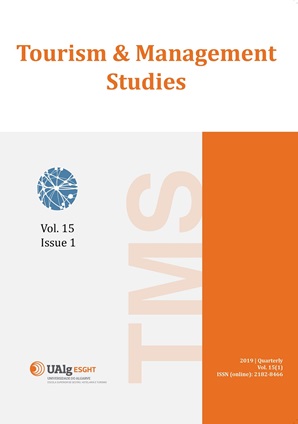Rio de Janeiro residents’ perceptions of the 2016 Olympics in the pre-games period
DOI:
https://doi.org/10.18089/tms.2019.150105Keywords:
Rio de Janeiro, 2016 Olympic Games, resident perceptions, sport mega-eventsAbstract
Between 2014 and 2016, Rio de Janeiro hosted two mega sport events – the Fédération Internationale de Football Association World Cup and the Olympic Games – which generated changes in the city. This study sought to analyse Rio residents’ perceptions in the lead-up to the latter games. A quantitative survey was conducted face-to-face with a sample of 404 residents, exactly one year before the Olympics. The data indicated that the residents found the pre-game period troubling because of uncertainties regarding the city’s desired Olympic legacy. Residents’ routines were impacted by either traffic issues or media reports that generated expectations and apprehension. The pre-Olympic period was marked by protests, concerns about overspending, construction delays and fears about the mega-events’ success. However, residents’ perceptions included clear expectations regarding the event legacy’s implications for tourism businesses and the destination’s visibility, as well as lasting improvements affecting tourism and sport activities.
References
Allen, Johnny; Harris, Robert; McDonnell, Ian; O’Toole, William (2003). Organization and event management. Rio de Janeiro: Elsevier.
Atkinson, Doreen (2009). The 2010 World Cup and the rural hinterland: maximising advantage from mega-events, In U. Pillay, R. Tomlinson, O. Bass, Development and dreams: the urban legacy of the 2010 Football World Cup (p.153-173). South Africa: HSRC Press.
Andereck, K. L., Valentine, K. M., Knopf, R. C. & Vogt, C.A (2005). Residents’ perceptions of community tourism impacts. Annals of Tourism Research, 32(4), 1056-1076.
Bolfarine, H.; Bussab, W. O. (2005). Elementos de amostragem. São Paulo: Edgard Blücher.
Burbank et al., 2001: 59, Mihalik, 2000, 2003: Handbook of Research on Sport and Business, published in 2013.
Chappelet, Jean-Loup (2012). Mega sporting event legacies: a multifaceted concept. Papeles de Europa. n. 25, 76-86. Doi: http://dx.doi.org/10.5209/rev_PADE.2012.n25.41096
Deccio, C., & Baloglu, S. (2002). Nonhost community resident reactions to the 2002 Winter Olympics: the spillover impacts. Journal of Travel Research, 41(1), 46-56. doi: 10.1177/0047287502041001006.
Duran, Pere (2005): The impact of the Games on tourism: Barcelona: the legacy of the Games, 1992-2002 [online article]. Barcelona: Centre d’Estudis Olímpics UAB. Accessed on 12 August 2017. Available at : http://olympicstudies.uab.es/pdf/wp083.pdf
Guala, Alessandro and Turco, Douglas Michele (2009). Resident perceptions of the 2006 Torino Olympic Games, 2002–2007, Choregia. Sport Management International Journal, 5 (2): 21–42.
Jago, Leo Kenneth (1997). Special events and tourism behaviour: a conceptualisation and an empirical analysis from a values perspective. Tese Doutorado em Filosofia, Department of Hospitality, Tourism and Marketing, Faculty of Business, Victoria University, Victoria.
Kao, C., Turco, D. M. and Wu, C. (2010). Taipei residents’ perceptions of the social impacts attributed to the 2009 Summer Deaflympics. Report to the 2009 Deaflympics Local Organizing Committee, Taipei.
Lohmann, Paola Bastos (2010). Mega sporting events: impacts on the host cities tourism. Master Thesis, Master in Business Management, Getúlio Vargas Foundation, Rio de Janeiro.
Mihalik, B.J. (2000). Host population perceptions of the 1996 Atlanta Olympics: Support, benefits, and liabilities
Tourism Analysis 5 (1), 49-53
Mihalik, B.J. (2003). Host Population Perceptions of the 1996 Atlanta Olympics: Benefits and Liabilities. International Olympic Committee Symposium on the Legacy of the Olympic Games: 1984-2000 : 339-345.
OECD (2005). Glossary of Terms Statistic. Accessed on April 7, 2014, in https://stats.oecd.org/glossary/detail.asp?ID=2620.
Pappas, Nikolaos (2014). Hosting mega events: Londoners' support of the 2012 Olympics. Journal of Hospitality and Tourism Management, 21, 10-17.
Portal Brasil (2015). País receberá até 500 mil estrangeiros nos Jogos Rio 2016. Retrieved November, 1, 2016 from http://www.brasil.gov.br/turismo/2015/12/pais-recebera-ate-500-mil-estrangeiros-nos-jogos-rio-2016
Portal Brasil (2016). Rio recebeu 1,2 milhão de visitantes durante Jogos Olímpicos. Retrieved November, 1, 2016 from http://www.brasil.gov.br/turismo/2016/08/rio-recebeu-1-2-milhao-de-visitantes-durante-jogos-olimpicos.
Poynter, G. (2006). From Beijing to bow bells: Measuring the Olympics effect. London: London East Research Institute, University of East London.
Preuss, H. (2007). The conceptualisation and measurement of mega sport event legacies. Journal of Sport & Tourism, 12:3-4, 207-228
Preuss, H. (2008). Aspectos Sociais dos Megaeventos Esportivos. In: Rubio, K. (Org.). Megaeventos esportivos, legado e responsabilidade social. São Paulo: Casa do Psicólogo, p. 13-35.
Ritchie, J. R. Brent and Catherine E. Aitken (1984), Assessing the Impact of the 1988 Olympic Winter Games: The Research Program and Initial Results, Journal of Travel Research, 22 (Winter), 17-25.
Sousa, P. R. P. ; Miranda, R. B. ; Moreira, T.B.S. ; Tabak, B.M. (2012). Impactos econômicos e investimentos setoriais da copa de 2014 no Brasil. Revista de Economia e Administração, 11(1), 75- 92.
Turco, D. M. (1998). Residents' perceived social costs and benefits attributed to an international staged attraction. Journal of Travel and Tourism Marketing, 7(1), 21-28.
Werner , K, Dickson , G & F Hyde, K. (2015). Learning and knowledge transfer processes in a mega-events context: The case of the 2011 Rugby World Cup. Tourism Management, 48(June 2015), 174-187.
Zhou, Yong; AP, John. Residents’ perceptions towards the impacts of the Beijing 2008 Olympic Games. Journal of Travel Research, v. 48, n.1, 2009. pp.78-91. Disponível em: < http://journals.sagepub.com/doi/abs/10.1177/0047287508328792>. Acesso em: 22 mar 2017.
Downloads
Published
Issue
Section
License
Copyright (c) 2019 Tourism & Management Studies

This work is licensed under a Creative Commons Attribution-NoDerivatives 4.0 International License.
The journal retains published articles’ copyrights, but they are simultaneously licensed under the Creative Commons Attribution License (CC BY-NC-ND), which allows individuals’ to share the relevant papers as long as authorship and publication in this journal are duly acknowledged.



